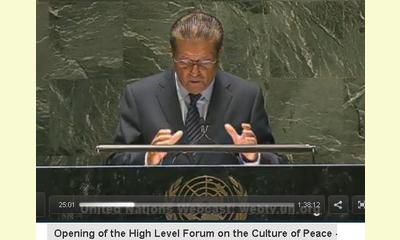|
|
The Second United Nations High Level Forum on the Culture of Peace
un article par NGO GMCoP
President of the United Nations General Assembly
(UN-PGA) and Global Movement for the Culture of
Peace (GMCoP) will jointly present the Second UN
High Level Forum on The Culture of Peace (HLF/CoP)
as a daylong program to be held at the United
Nations – NY Headquarters/Trusteeship Council
Chamber on Friday 6 September 2013 from 9:30a.m.
to 6:00p.m.

Former UNESCO Director-General Federico Mayor speaking at the 2012 High Level Forum
click on photo to enlarge
Convened by the President of the 67th General
Assembly, H.E. Mr. Vuk Jeremić, the HLF/CoP will
have an opening ceremony at the UN where the
President and Deputy Secretary-General will speak.
Afterwards, three panel discussions will follow:
"The role of interfaith cooperation in promoting a
global Culture of Peace" in the morning session,
"The Culture of Peace as the agenda for a new
global civilization: Where are we now?" and
"Strategies for advancing implementation of the UN
Programme of Action on Culture of Peace: What we
need." in the afternoon session.
Special focus of the High Level Forum will be on
the implementation of the UN Programme of Action
on Culture of Peace adopted by the UN General
Assembly 13 September 1999. (A/RES/53/243). The
role of religious and interfaith cooperation in
promoting a global Culture of Peace will also be
one of the important areas to be dwelled on in
this year’s Forum.
The Eight Program of Action Areas of the Culture
of Peace (A/RES/53/243 Section B) will be put on
the table in each panel. They include: education;
sustainable economic and social development; human
rights; equality; democratic participation;
understanding, tolerance and solidarity;
communication and the free flow of information and
knowledge; international peace and security. These
issues will be presented by the member states, UN
officials, experts, inter-governmental, non-
governmental organizations (NGOs), civil society,
youth, academicians, and religious leaders.
This UN-GA High Level Forum is intended to be an
open opportunity for the UN member states, UN system
entities, and civil society—including NGOs, media
and private sector in discussing the ways and means
to promote the Culture of Peace.
Draft programme of the High Level Forum will be put
on the website of the President of the General
Assembly in due course.
Online Registration Form will be available on the
website of GMCoP to all interested parties by August
20, 2013, and will be closed by Tuesday, September
3, 2013. All must register, including UN
cardholders.
Register here.
The High Level Forum on The Culture of Peace will
also be live webcast at: http://webtv.un.org
(Please note that it is not necessary to register to
view the webcast.)
|








|
DISCUSSION
Question(s) liée(s) à cet article:
What is the United Nations doing for a culture of peace?,
* * * * *
Commentaire le plus récent:
Following the Second High Level Forum of the United Nations on the Culture of Peace, Anwarul Chowdhury, a former Under-Secretary General of the UN, had this to say about what the UN is doing for a culture of peace. His remarks were published by the Independent European Daily Express.
Civil society worldwide has been in the forefront of the global movement for the culture of peace, working diligently and patiently at the grassroots level, he said.
"I find it is the governments and power structures which are the most persistent foot-draggers with regard to advancing the culture of peace through policy steps and action," said Chowdhury, a former U.N. under-secretary-general and currently representing civil society and the Global Movement for the Culture of Peace. . .
The United Nations, he pointed out, has shown great vision by adopting its historic, norm-setting Declaration and PoA on the Culture of Peace in 1999, but has not been organised enough in making the document a system-wide flagship effort of the world body.
"I am a believer that the world, particularly the governments, will come to realise its true value and usefulness sooner than later," Chowdhury said.

|
|









